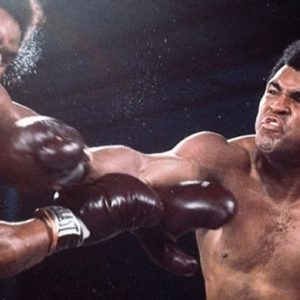Muhammad Ali, ‘The Greatest of All Time’, refused induction into the United States Army on this day 55 years ago.

Ali, who opposed the Vietnam War on religious and political grounds, was then sentenced to five years in prison, stripped of his world title, suspended from boxing, and fined $10,000.
While Ali is known as one of the most talented heavyweight boxers in history, his actions outside the ring have cemented him in public memory as a social and political activist. In an explanation for his refusal, Ali famously told a crowd of students:
“My enemy is the white people, not Viet Cong or Chinese or Japanese. You my opposer when I want freedom. You my opposer when I want justice. You my opposer when I want equality. You won’t even stand up for me in America for my religious beliefs — and you want me to go somewhere and fight, but you won’t even stand up for me here at home?”
While his actions are often widely celebrated now, Muhammad Ali became a target of hatred and anger when he refused induction in 1967. As Ishmael Reed wrote in The Village Voice in 1978:
“It seemed that the whole nation wanted to spit in his face, or skin The Grand Flesh. Not only, to them, was he a draft-dodger but he was also a member of a misunderstood religion which the media had hyped into a monstrous black conspiracy.”
Just one year after defeating Cleveland Williams in what is often considered to be Muhammad Ali’s finest performance, the heavyweight champion was banished from the boxing ring and forced to relinquish his title. The title was given to Ernie Terrell, who had lost to Ali just two months before the refusal.
Check out Muhammad Ali vs. Cleveland Williams here:
For three years, during his prime years, Ali did not box. However, because he was waiting on an appeal with the Supreme Court, he did not have to serve jail time. In 1971, the Supreme Court overturned the decision and his sentence was dropped.
Muhammad Ali’s return to the ring
Muhammad Ali returned to the ring in 1970 after managing to get a license to fight ‘Irish’ Jerry Quarry in Atlanta, Georgia. Quarry, who had fought the likes of Floyd Patterson and Joe Frazier, was likely the most popular boxer in America at the time. Ali stopped him in just three rounds.
After stopping Oscar Bonavena in December 1970, Ali challenged Joe Frazier, the WBA and WBC Heavyweight Champion. The men met on March 8th 1971 in Madison Square Garden in a bout that is now referred to as ‘The Fight of the Century.’ Due to Ali’s refusal, his successful appeal, and his former status as the Undisputed Heavyweight Champion, the fight became one of the most publicized sporting events in history.
‘The Fight of the Century’ was a truly great fifteen-round contest. It opened with a dominant performance by Ali but Frazier’s power and expert bobbing and weaving defence allowed him to wear the former-champion down. In the fifteenth round, Ali was dropped by a tremendous left hook to the jaw. Though he managed to get to his feet, Ali suffered the first loss of his career on the scorecards.
The contest with Joe Frazier led to what is arguably the best trilogy of fights in boxing history. Muhammad Ali later reclaimed his world title, became the only three-time heavyweight champion in boxing history, and demonstrated his greatness in bouts with all-time greats such as Frazier, George Foreman, and Ken Norton.
Check out Ali vs. Frazier III here:





